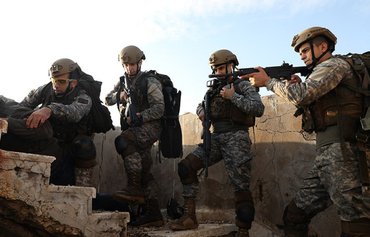As Egyptian forces work to sever the revenue streams that feed "Islamic State of Iraq and Syria" (ISIS) affiliate Wilayat Sinai, the group has turned to narcotics dealing in order to finance its operations, military officials said.
This illegal and socially irresponsible activity is motivated purely by financial gain, they said, noting that it clearly trumps the group's purported religious beliefs.
Reeling from heavy losses in Sinai, and with its foreign revenue stream reduced to a trickle, drugs have become the group's primary source of funding.
During 2017, the armed forces reported 312 cases of smuggling in Sinai, Egyptian military spokesman Col. Tamer al-Rifaie said on Monday (January 1st).
Egyptian forces seized hundreds of kilogrammes of various types of drugs, he said, including cannabis, heroin, opium and cocaine, along with narcotic pills and ampoules.
They also managed to locate and destroy narcotic crops -- 104 feddans of cannabis and 256 feddans of opium-producing poppies, he said.
On December 25th, the army discovered a depot containing a huge amount of cannabis and five vehicles loaded with drugs, al-Rifaie said.
ISIS needs to buy loyalty
"ISIS needs money to buy the loyalty of its members and provide weapons for its terrorist operations, which is why it has resorted to dealing in drugs," military expert Maj. Gen. Mukhtar Qandeel told Al-Mashareq.
Investigations have revealed ISIS has entered into partnership with drug smugglers who would previously smuggle weapons for the group, he said.
These indicate "the group has relied on selling drugs to provide revenue, due to the successful Egyptian and international intelligence operations to cut off their main sources of funding", he said.
"The dismemberment of the group in Syria and Iraq has prompted its members in Sinai to search for alternative sources of funding," Qandeel added.
The vast, sparsely populated expanse of northern Sinai makes it easy for them to cultivate these crops far from the watchful eye of the police and army, he said.
The area's mountainous terrain "makes it easy to smuggle goods", said Ahmed Ban, an expert on extremist groups.
"ISIS in Sinai started several months ago to search for new ways to fund its terrorist operations," Ban told Al-Mashareq.
"Drug smuggling is now a key source of income for the group, as cultivating and selling drugs is a reliable way for it to make money in the Sinai region," he said.
There is a religious conflict within ISIS regarding the smuggling of narcotics, he noted, but in the same manner as al-Qaeda in Afghanistan before it, it has persisted along this path as a way to ease the pressure on its finances.
'The last nail in ISIS's coffin'
Wilayat Sinai has been trying to circumvent the army’s efforts to disrupt its cashflow by resorting to drug dealing, military expert Maj. Gen. Thawrat al-Nasiri told Al-Mashareq.
"Egypt’s war on the terrorist group in Sinai is almost over, and once the army succeeds in cutting off the drug trade for ISIS, this will be the last nail in its coffin in Sinai," he added.
Investigations conducted by the Public Prosecutor in Egypt indicate that "drugs have become a substantial source of funding for the group, that allows it to make up for the consecutive losses in weapons", he said.
"The recent successes of the security forces in confiscating large quantities of narcotics and the elimination of ISIS drug smugglers means [Egyptian forces] are well prepared for the last battle in the war against ISIS," he added.
Al-Nasiri said he was confident that this will cull the ISIS leadership, noting that the group has already suffered losses of weapons and funding sources.
It also has been losing popular support and has been failing to attract new recruits following the al-Rawdha mosque attack on November 24th, he said.
"The group’s drug dealing belies the religious principles it claims to believe in," he said.
This proves its fighters "are nothing but murderers in the name of religion, who seek to achieve their personal interests in the form of revenge and enriching themselves", he added.

![A man smokes a hashish joint at his home in Cairo in this file photo from April 4th, 2010. According to the Egyptian army, 'Islamic State of Iraq and Syria' affiliate Wilayat Sinai has been engaged in the drug trade to raise money for its operations. [Victoria Hazou/AFP]](/cnmi_am/images/2018/01/05/10964-Egypt-hashish-user-600_384.jpg)







The wish of my life is not to see Ahmed Moussa on TV.
Reply1 Comment(s)